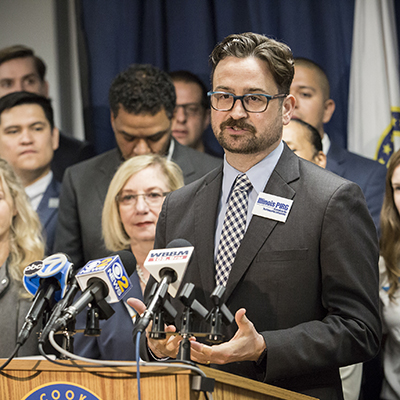
Illinois PIRG Education Fund tips to protect yourself from surprise medical bills
Imagine you go to a hospital for a routine procedure. You’ve made sure your hospital and doctor are covered by your insurance. The procedure goes well and you head home to recover. Two weeks later, you get the bill, but instead of the copay you expected, you get a bill for nearly $4,000. Turns out, the anesthesiologist who assisted with your procedure was “out of network” and your insurance won’t cover that bill as expected. You’ve received a surprise medical bill and now owe the difference between what your insurance will pay the out-of-network anesthesiologist and what you were billed.
Illinois PIRG Education Fund’s tips to protect yourself from surprise medical bills
Imagine you go to a hospital for a routine procedure. You’ve made sure your hospital and doctor are covered by your insurance. The procedure goes well and you head home to recover. Two weeks later, you get the bill, but instead of the copay you expected, you get a bill for nearly $4,000. Turns out, the anesthesiologist who assisted with your procedure was “out of network” and your insurance won’t cover that bill as expected. You’ve received a surprise medical bill and now owe the difference between what your insurance will pay the out-of-network anesthesiologist and what you were billed.
What is a “surprise medical bill?
You receive a surprise medical bill when, through no fault of your own, you are treated by providers outside of your insurance network. These out-of-network providers can charge exorbitant rates only revealed when the bill arrives in the mail. The average emergency room surprise bill is around $600, but these bills can range into the tens or even hundreds of thousands of dollars. When out-of-network providers charge these high rates, it drives up costs for everyone. Consumers are burdened with higher bills that they had no way to avoid. And when insurers have to pay their share of this higher charge, they’re likely to pass on that cost to everyone by raising premiums.
Know your rights
In Illinois, some patients are protected from certain surprise medical bills. It is important to know your rights to protect yourself from these illegal out-of-network charges. If you have insurance through Medicare, the Medical Assistance Program, or are on Veterans Affairs Health Care, you are fully protected from surprise bills. This tip sheet is for people with any other type of insurance.
If your insurance plan is regulated by Illinois state law, you are protected from surprise bills in two situations:
-
when you receive care at an in-network facility or ambulatory surgery center from out-of-network providers who provide radiology, anesthesiology, pathology, neonatology services.
-
emergency department services at an in-network facility or ambulatory surgery center.
In these situations, you cannot be charged for anything more than what you would normally owe for in-network treatment. The out-of-network provider should not send you a bill. If you do receive one, you should not pay it. Instead, follow the steps below on “How to fight a surprise bill” and inform your insurer at once.
Exceptions to surprise billing protections
Illinois consumer protections against surprise medical bills do not apply to all patients and all situations.There are some exceptions. You could be required to pay an out-of-network bill in the following situations:
-
If you purposely choose a provider or facility not within your insurance network
-
If you were treated at a facility that is out-of-network.
-
If your insurance plan is not a “state-regulated” plan:
-
Illinois’ surprise billing protections only apply to insurance plans regulated by the state. Many Illinois residents who have insurance through their employer are on plans that are federally regulated. If you are unsure whether your plan is state-regulated, contact your insurer. You can also call the Department of Insurance for help at (877) 527-9431.
-
If the provider is not a “facility-based provider.” If your bill is not from a provider who gave radiology, anesthesiology, pathology, neonatology, or emergency department services, you are not protected from it by Illinois state law.
How to prevent a surprise bill
Because Illinois law does not protect everyone and every situation, here are a few steps you should take to prevent a surprise bill.
-
Check with your insurer to make sure you are choosing a provider that is covered by your insurance. Make sure that the hospital or health care facility (lab, diagnostic center, surgery center) is in your insurance network before receiving treatment.
-
When planning hospitalizations at an in-network facility, check with the facility to ensure that all providers (surgeons, anesthesiologists, and others), lab services (such as blood work) and imaging services (such as X-rays, MRIs) are covered by your insurance plan. Be specific in requesting that all services you may need are covered by your insurer.
-
Know your nearest in-network emergency room. You will be responsible for bills for emergency treatment if you go to an out-of-network facility.
Choosing an out-of-network provider
Many insured Illinois residents are covered by an HMO plan which does not cover out-of-network services. But if you do have a plan that has an out-of-network benefit, you can still choose an out-of-network provider at an in-network facility. However, actively choosing an out-of-network provider will result in a higher copay and additional costs your insurer will not cover. If you use an out-of-network provider because there are no in-network providers available, you are not making a voluntary choice and you cannot be billed for more than your in-network copay or deductible.
How to fight a surprise medical bill
-
Make sure you are looking at an actual bill or invoice. An “Explanation of Benefits” is not a bill.
-
If the bill looks incorrect, do not pay it. Sometimes bills are sent before the insurance company has made its portion of the payment. Call your insurer and ask for more information.
-
If you think you have received a surprise medical bill, you can use your rights to fight the charges. But first, be sure it is a bill covered by the consumer protections. Here are a few questions to ask. If you are able to answer yes to all these questions, then you should not have to pay the bill:
-
Is your insurance plan state-regulated? If you are unsure whether your plan is state-regulated, you can call the Department of Insurance’s Office of Consumer Health Insurance at 877-527-9431.
-
Is the bill for more than your typical copay for in-network services?
-
Was the facility in-network?
-
Is the bill for services related to radiology, anesthesiology, pathology, neonatology or an emergency?
-
If you think you’ve been sent a bill you should not have to pay, file a complaint with your insurer. Then file a complaint with the Illinois Attorney General either online or by calling 1-877-305-5145.
If your bill does not meet all the requirements above, you may still be able to lower the amount you owe. See below “Tips for lowering a medical bill.”
NOTE: If you purposely chose a provider who is not covered by your insurer, you may have waived your surprise billing rights.
Tips for lowering a medical bill
-
Ask for an itemized bill and check that you are not being mistakenly billed for treatment you did not receive.
-
Compare the itemized bill to your Explanation of Benefits to see whether your insurer is paying its share. Sometimes patients are billed for services because their provider sent the wrong billing code to the insurer.
-
Contact your provider and ask about anything you don’t understand.
-
Contact your insurer to see if any mistakes were made on their end.
-
If there are no mistakes, try negotiating with your provider. Many hospitals have patient advocate departments to help you negotiate the bill.
-
Contact the office of the Illinois Attorney General at 1-877-305-5145. They may be able to help you fight the bill.
-
Keep careful notes of all conversations you have. Get the names of the people you are speaking to. Keep your files in one place for easy access.
-
Be patient and clear in your requests.
Special information during the COVID-19 pandemic
Testing for COVID-19 is free for both insured and uninsured consumers. Health plans are required to cover the cost of testing (even if you don’t have symptoms or have not been exposed to someone with COVID). This means that if you want to be tested for any reason, such as before visiting a family member, your insurance must pay for the test and cannot bill you for any copay, coinsurance, or deductible.
Even though the test is free, many people have been billed for other fees, such as a “facility fee.” When you choose a testing site, call to be sure there are no additional fees the site will charge. In Illinois, you can also be tested at CVS, Walgreens, eTrueNorth, Health Mart, and Walmart at no cost. You do not need a referral to be tested at these pharmacies, but you do have to arrange an appointment beforehand. To find out more about COVID testing in your state, use this resource.
All plans are required to pay for any approved COVID vaccine and any administration costs. You are not required to pay any cost-sharing (copay, coinsurance, or deductible) related to getting a vaccine against the COVID-19 virus.
More consumer protections are coming in January 2022
In a victory for consumers, Congress passed the No Surprises Act to expand surprise billing protections to all insured Americans. This means that Illinois residents insured by federally regulated plans who are currently without state protections will be protected from surprise bills. The federal protections also expand the scope of Illinois’ existing protections. The law bans surprise medical billing from all types of out-of-network providers. It also prevents surprise bills for emergency services at out-of-network facilities and for transportation by air ambulances.
Last updated March 3, 2021.
Topics
Authors
Abe Scarr
State Director, Illinois PIRG; Energy and Utilities Program Director, PIRG
Abe Scarr is the director of Illinois PIRG and is the PIRG Energy and Utilities Program Director. He is a lead advocate in the Illinois Capitol and in the media for stronger consumer protections, utility accountability, and good government. In 2017, Abe led a coalition to pass legislation to implement automatic voter registration in Illinois, winning unanimous support in the Illinois General Assembly for the bill. He has co-authored multiple in-depth reports on Illinois utility policy and leads coalition campaigns to reform the Peoples Gas pipe replacement program. As PIRG's Energy and Utilities Program Director, Abe supports PIRG energy and utility campaigns across the country and leads the national Gas Stoves coalition. He also serves as a board member for the Consumer Federation of America. Abe lives in Chicago, where he enjoys biking, cooking and tending his garden.
Find Out More

Safe At Home in 2024?

5 steps you can take to protect your privacy now

Too much to recall
